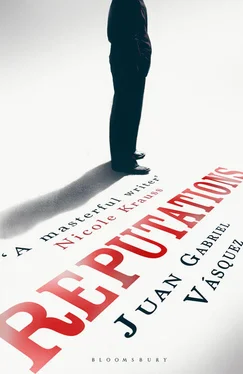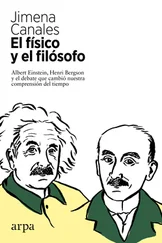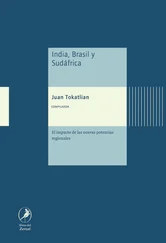‘Is that what you want, Samanta?’
‘Oh, I don’t know,’ she said. ‘I have a headache.’
‘We can stop and buy something.’
‘And I want to change my clothes,’ said Samanta. ‘I can’t stand wearing dirty clothes.’
‘Well, those dirty clothes look very good on you,’ said Mallarino. He hadn’t meant it to sound like a cheap flirtatious compliment but that’s how the words came out. Not that it wasn’t true: in the morning, when Samanta came out of Beatriz’s old room with her hair wet from the shower, but wearing the same blouse and the same skirt from the day before, Mallarino had found the sight strangely erotic. He didn’t say so to Samanta, of course: women have no reason to comprehend men’s idiotic impulses, or even put up with them or tolerate them, or endure every compliment thrown at them, no matter how well intentioned. That’s all his comment had been, and nevertheless he noticed or thought he noticed a sudden tension in Samanta’s muscles, her shoulders bracing against the back of her seat, her stretched-out legs folding up. Had it bothered her? ‘I have a headache,’ she said again, but talking to herself this time. A motorcycle with its lights on veered past; behind him was a pickup truck with darkened windows, and further back, a military van with rifle barrels sticking out: the President, or some minister? Now Samanta wiped her eyes again, rubbing them carelessly, the way you’re never supposed to do (a risk of seriously scratching the corneas). On her index finger, Mallarino noticed a wet trail like that of a snail.
‘Where should I turn?’ he said.
‘Pretty soon,’ said Samanta, ‘I’ll let you know.’ And after a silence: ‘This is fucking hell. Not knowing is not hell. The hellish thing is not knowing whether I want to know. Or if I’m better off the way I was before.’ Mallarino said yes, that he felt the uncertainty too, that he also — ‘No, you don’t know,’ Samanta cut him off. Mallarino sensed some hostility. ‘You can’t know. None of you can. People like you think you know, imagine you know, and it’s not true. If you only knew how insulting that is. Believing you know. Believing you can imagine. It’s not like that.’
‘You don’t understand, Samanta.’
‘It’s an insult. That you believe. That you imagine.’
‘That’s not what I meant to say,’ said Mallarino. ‘Don’t be like this, please.’
With a gesture that struck Mallarino as at once weak and authoritarian, Samanta pointed to a street with dark brick walls topped with broken glass: some transparent, some green, testimony to other, more innocent times when such strategies deterred thieves. ‘Turn down here. Then take the second right. But don’t miss it, or it’ll take forever to get back round.’ Samanta’s voice sounded fragile, as if it were catching somewhere. ‘That building, the only one there is,’ she said, or rather ordered, and raised her hand enough to point at a brick box with white aluminium-framed windows and net curtains behind the windows and silhouettes of women behind the net curtains: there, on a street of old Chapinero houses, Samanta’s building looked like something someone had forgotten. She pointed to a spot by the kerb where Mallarino could park: beside a tree with a thick trunk and roots growing over the pavement. A car must have just left, after the rain stopped, because a perfect dry rectangle of lighter grey was still visible on the dark grey surface.
Before they had stopped completely, with the wheezing murmur of the car’s engine still cutting off the softest syllables, Samanta said: ‘Fifteen, Señor Mallarino.’ A bicycle messenger went past, his right trouser leg tucked inside a fluorescent orange sock. ‘I was fifteen years old. My dad was away on a trip. He travelled a lot, an insurance salesman can travel a lot: Cali, Cartagena, Medellín, and, at some point, Caracas, Quito, Panama. I was at a party. My mum asked me specifically to come back early, because my dad was arriving home from a trip that night and we had to be there waiting for him. My mum’s life revolved around things like that. Having his dinner ready. His family waiting for him when he got home. I was a good girl, did what I was told. And that night, when I got home, I found my mum waiting in the kitchen. All the lights in the house were turned off, except for the one on the stove. You know the one? The little yellow light on the extractor fan, which was on even though nothing was cooking. And my mum there, sitting by the counter, eating fried pork rinds out of the bag. That’s something I’ll never forget: the crackling, pork rinds straight from the bag. She told me he hadn’t come home. At six the next morning we drove across the city, went into the airport car park. He always left his car at the airport: his trips lasted two days, never any longer. We went into the car park and we were driving around for a long time, until we found it. There was my dad’s car. I looked through the window to see what was inside. I don’t know what I expected to find, but I looked in. The windows were dirty, because it had rained. And do you know what I saw, Señor Mallarino?’ He gripped an imaginary bar; he waited for a terrifying or macabre revelation. ‘I didn’t see anything,’ said Samanta. ‘There was nothing inside. Not a key ring, not a single toll receipt, no loose change. The windows dirty and the car, inside, clean. Clean as if he were going to sell it that afternoon. I think my mum knew deep down. She didn’t seem worried: I thought that deep down she knew my dad had left. . and the weird thing is that none of this has ever been a problem for me, Señor Mallarino. What happened to my family has happened to hundreds of families, thousands. For me it’s never been a problem. But last night I began to ask myself stupid things. What did my dad’s leaving have to do with that night? Was there any link? No, what link could there be, I don’t see it. But is there one, even though I can’t see it?’ Mallarino saw her press her jaw to her chest, squeeze her eyes shut. ‘What I want to know is what happened here,’ Samanta said then. Her voice, damp and thick, had a sort of urgency in the rarefied air inside the car. ‘Here,’ said Samanta. She began to cry again, but her crying was more candid this time; it distorted her features, stole her beauty. Samanta was patting her belly and mouth, the expression on her mouth stretched. ‘What happened here,’ she was saying, ‘I want to know what happened here.’ Mallarino stared at her hands; he interrogated them, interrogated their tapping against her body; Mallarino didn’t understand. There, parked in front of her building, Samanta grimaced with impatience and her mouth suddenly released a pent-up breath.
It was a rapid movement: she put both feet up on the dashboard and lifted up her hips and pulled her green wool tights and her soft white knickers down with a single skilful shove, sticking both thumbs under the elastic, under both elastic waistbands at once, and pushing forward, not in a straight line but tracing a curve in the air like a bowl, like a smile. The mess of wrinkled clothes bunched around her ankles, and in a brief instant Mallarino saw the calves clustered with red spots and a violet oval on one thigh, where she had a bruise. Samanta separated her knees and opened her legs and all the light in the world invaded the four-by-four and illuminated the pale sex, straight, blond, sparse pubic hairs, the insolent vulva. Samanta’s hand closed over her vulva, moved away, then closed again with straight fingers over the diaphanous skin of her lips: ‘Here,’ said Samanta, ‘I want to know what happened here. Is this what you saw, Señor Mallarino? Was this what you saw twenty-eight years ago? What do you think? Has it changed a lot?’ Mallarino looked up and saw, in a window of the brick building, the silhouette of someone who’d pulled aside the net curtains to get a better view. No it wasn’t a curious man, not a peeping Tom: it was an older woman, and Mallarino managed to see her housecoat and her expression of revulsion before she hid behind the delicate white shadows of the curtains. He tried to turn round; he was prevented by his seat belt; Mallarino unfastened it and turned round to reach for his raincoat on the back seat. He found it on the floor (it must have slipped off the seat on the way down the mountain road) and grabbed it with one hand and threw it on top of Samanta, at first with irritated gestures, and then as if covering up a little girl with a chill. ‘Here, here, here,’ she was saying, and she covered her face with her hands.
Читать дальше












